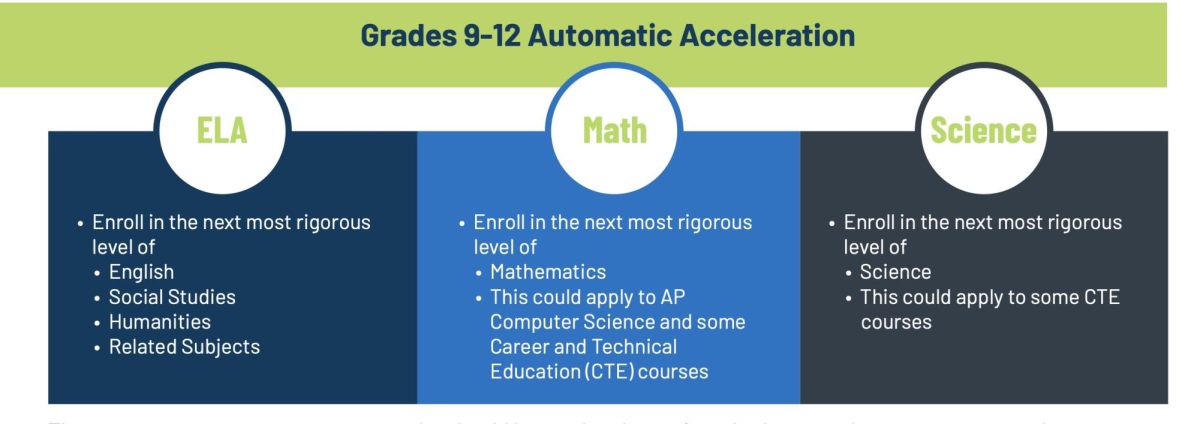Schaumburg High School, along with all other Illinois public schools, will begin to implement the policies of the Accelerated Placement Act starting next school year.
The Accelerated Placement Act states that if a student meets the state standards in ELA, math, or science, they are to be automatically placed in accelerated placement programs, which is a level higher than what their score would usually represent. Students placement is predicated on a variety of standardized tests.
For grade 9 placement, schools look at students’ scores on the IAR (Illinois Assessment of Readiness) for ELA and mathematics, the 8/9 PSAT, and the ISA (Illinois Science Assessment.) The PSAT 8/9, PSAT 10, and ISA scores determine placement for sophomores and juniors. As for rising seniors, SAT scores and Analysis in Science combined scores are the determining factors.
More specifically speaking, District 211 advancement is determined by scoring a 430 on the PSAT 8/9 Grade 8th math test for grades 9 and 10. Rising juniors must earn a score of 480 on the PSAT. English placement is also determined by PSAT scores for 9th and 10th grade acceleration and SAT scores for 11th grade. This is a big shift in course selection because it was previously based on a combination of student interest and teacher recommendation.
“The benefit is students can accelerate their learning as long as they put the work in,” states math department chair Mr. Gruszka. “We will provide extra support for these students throughout the day and within the courses themselves.”
The purpose of this is to promote equal opportunity for students and challenge them to achieve higher goals. The Illinois State Board of Education labels it as an “option for students to enroll in alternative coursework that better aligns with the student’s postsecondary education or career goals.”
“It’ll open up students’ ideas [and they will] consider some options that maybe weren’t there in the past,” said SHS Student Services Director Yassi Delgado.
However, some are concerned that some students may be placed in an accelerated class in which they are not fit to take, which may cause the student to struggle and perform poorly compared to if they were placed in a class following their academic path.
Despite those concerns, there are certainly advantages of the Accelerated Placement Act. Like stated before, this act encourages students to push themselves and learn at a higher level. It creates a level of curiosity in terms of course consideration and also allows for more conversation to happen. This opportunity will be seen in direct-teacher-student relationships and with school counselors.
SHS Senior Ryan Smith says, “At the end of the day, it’s giving students new opportunities that would otherwise be unavailable to them. And if it doesn’t work out, there are other options to go back to a lower level where they’re more comfortable.”
Regarding potential questions parents and students may be wondering, Ms. Delgado recommends that people visit our school website to look at the current curriculum guide offerings. “Go onto ISBE, the Illinois State Board of Education. Find the time to engage your student in short-term goals, like what they want to take next year, and long-term goals.”
Students or families of students who do not wish to accept any course acceleration, however, are able to reject it. There is no obligation to move to accelerated classes if students do not wish to do so. The school is merely supposed to automatically offer the accelerated classes to students who qualify, but they and their parents have the final say.
Hopefully this will be the start of a new and improved process at SHS and beyond. If you have any questions about your course selection, make sure to reach out to your counselor to discuss any questions or concerns.
























